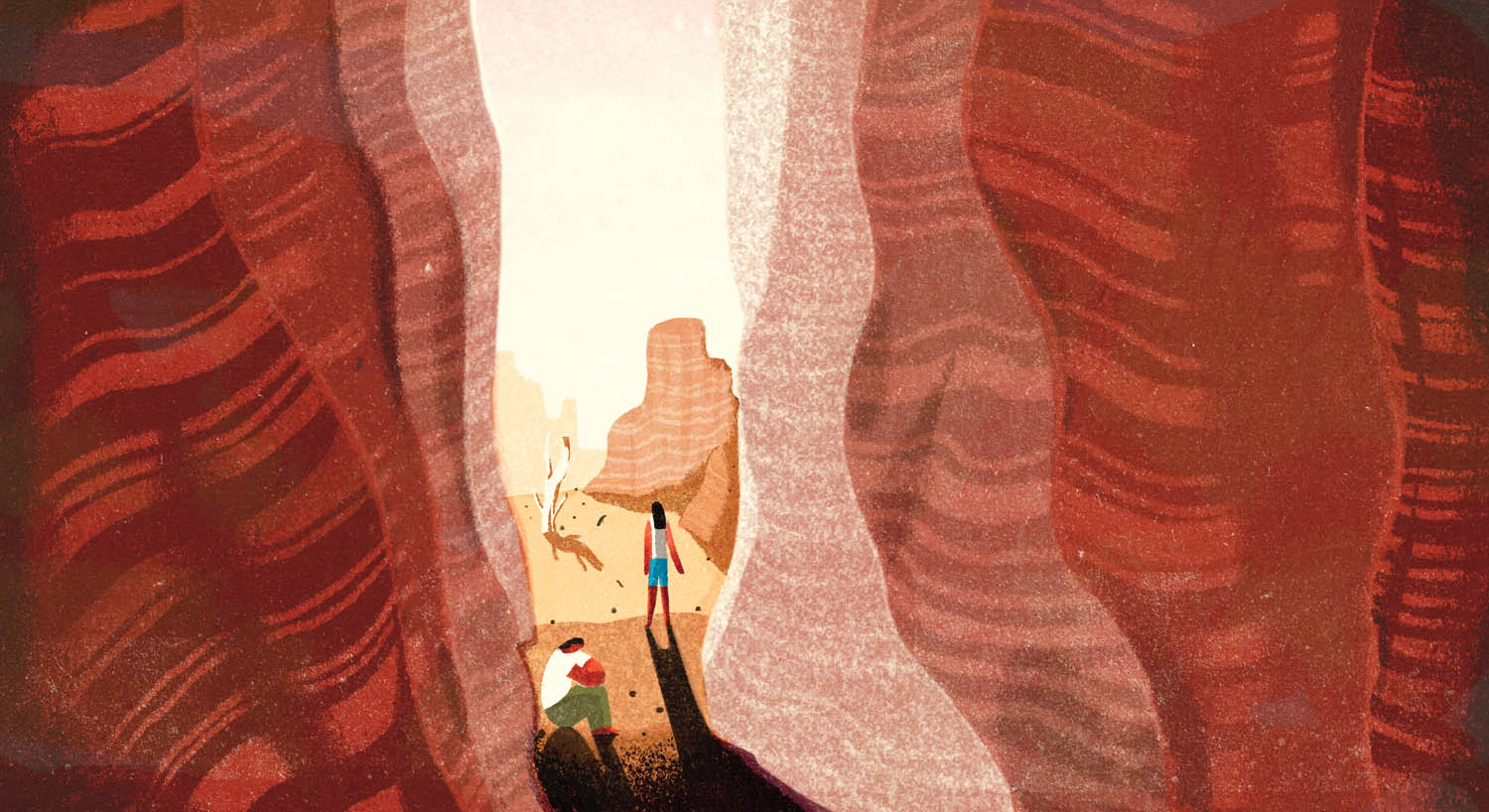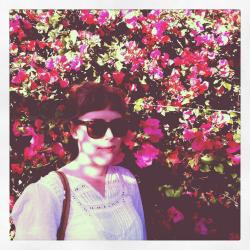We wake up in the badlands when the sun begins to rise. It was a mistake to keep walking in the dark last night. Every pathway the same, we could have walked in a hundred circles. We put our hands on the ravine walls and used the planets and the stars to orient ourselves. Walk south. We said it, “South, south, south, please, south.” But the planets and the stars, they shifted themselves. Venus, the North Star, Orion’s Belt, they hung themselves in different places each time we looked up. The moon set and the ravine walls became black as the sky and the stars were so bright and close we felt as though we were wading through the dark matter the universe is made of. We had to lie down, we had to sleep.
Which way did we come from? Our footprints point in different directions up and down the wash. Lines rake along both faces of the walls—our fingers are raw with cuts. There’s nothing to do but walk, the badlands so narrow sometimes we can hardly fit through. Thin ravines lead to wide washes with pale, dry trees that look like puffs of smoke. I take my shirt off and wrap it around my head to keep the sun off. My feet follow behind Sarah’s. In the deep sand, it’s easier to walk in footprints. When she gets tired, we switch places and she walks behind me. When I get tired, we switch places and I walk behind her. The sand glows white. Steps stop being motions, just sounds. Foot after foot hushing the sand.
“I think we’re lost,” Sarah said yesterday when the sun was low in the sky and turning orange and the feeling that the walk there was shorter than the walk back had just begun to rise inside us. “I don’t think so,” I said. I pointed straight ahead. “I think we’re just about there.”
We had parked our car next to the road and walked down into the badlands. We were on a trail, on a hike to an abandoned quartzite mine. We saw other hikers, two other women, who said hello, heading the way we had come from, back to the road, though we hadn’t seen another car parked by the trailhead. The mouth of the mine was filled in with sand. There were chunks of quartzite, cloudy white crystals, scattered all around. They used to use it to make lenses. Sarah filled her pockets.
We must have veered off the trail, or missed the slope back up to the car. We might have been close at some point. Or maybe not. We could have been miles away. Every branch of badlands looks the same.
Sarah stopped walking and looked up at the sun, nearly gone, then back the way we came. “I think we have to go back,” she said. “No,” I said, “we need to keep going south.” “What if we overshot it?” she asked. “We can’t have,” I said, but when the last of the light was gone I heard a hawk crying somewhere and its echo trickled down the ravine behind us and I said to her, “I think we overshot it.” Sarah didn’t raise her head. She turned her shoulders and started walking in the other direction.
“If I can get up there, I’ll be able to see where we are,” I say. I said the same thing yesterday. I try again to climb the walls, but they are so steep. The eggshell crust of sand crumbles under my hands.
When the sun clears the ravine wall on the second day, Sarah begins to shout, “Help! Help! Help! Help! Help! Help!” She looks right at the sun and she screams it. I put my arms around her and say her name to her. The sweat on her forehead stings my cheek. I can smell the salt of her. Her knees are badly scraped, but I don’t remember seeing her fall. “When we get back home,” she says when she is calm again and she has brushed the damp hair from her face. But what words will fill up the end of the sentence? We keep walking.
We walk and when the ravine splits and we must choose one side of a forking path to follow, Sarah sets a chunk of quartzite down to mark the path we choose. When she runs out of quartzite, she rips pages from her notebook filled with sketches of desert plants and birds and the topography of the badlands. She places them under stones. When the pages are gone, she begins to shred the cover. When she sets these things down, she lays a palm on them and closes her eyes.
We had water and now it’s gone. The sun right overhead. I can feel the want for water in my lungs, my blood. My tongue is a clump of thistles in my mouth. I have to sit down and breathe for a while. The ground is hot. It feels like it’s a part of me—it pulses. We share the same heartbeat.
I can feel that I am talking but I can’t hear what I’m saying. I look at Sarah and she looks afraid. Her face is burnt and her lips have begun to peel. I look down at my hands, the lines like a map, and I have an idea. I look back at Sarah to tell her. She isn’t looking at me anymore. She is poking at a black hole in the ground with a stick. The hole moves and I see it’s a beetle.
She is beside me now, touching my neck. She says a name to me, but it is not my name. I think about the other women we met on the trail. In my memory they look just like us.
“Sarah?” I say to her. She keeps on walking in front of me. “What?” she says. She sounds angry. I don’t go on.
“Sarah?” I say again later. “I’ve lost my shirt.” “It’s fine,” she says. “We’ll come across it again.”
She’s right. We never seem to find the quartzite, the drawings, the pieces of notebook again, but we come across the shirt. It’s there in the middle of a wide wash, my white shirt on a rock.
“There it is,” Sarah says. She picks the shirt up. She puts it on. I look down—I am wearing my shirt. My own white shirt. Oh, I think. It was Sarah’s shirt that was lost.
We walk and I hear Sarah whispering to herself. I ask her, “What are you saying?” She turns around. “I didn’t say anything,” she says. But when she turns back I hear the whispering again. I reach out to touch her shoulder, to tell her to stop whispering, but I see now she is not there. She is behind me, walking in my footsteps, sun casting a white circle onto her hair.
“Sarah?” I say.
“Why do you keep calling me that?” she asks.
When it is night again we lie in two furrows in the sand. I am looking at the stars thinking that there must be some way to know which way to go: the stars, the hawk, the path of the sun, the beetle, Sarah’s markers like breadcrumbs. I am looking at the stars and feeling a lightness. They look so close. I fall asleep wondering if the stars have been working at lowering themselves to Earth or if it’s that Sarah and I are floating up.
I wake when I hear Sarah crying. Hollow sobs like coughs. I hold her to me. Her body feels different. Bony. Brittle, her arms crossed over her chest, a tangle of branches. She is getting smaller. I can see it in the moonlight. She is the size of a child the size of a hawk the size of a beetle. In the morning she is gone.
It is not good to walk in the sun anymore. I find a very narrow ravine where my shoulders only just fit. I sit in the shade. The walls press down on me. Layers of rock millions of years of compression. At the trailhead a sign told us this desert used to be an ocean. I had looked for shells.
I think of all that water. On my shoulders I can feel the movement of the walls. Tectonic. Plate against plate. The badlands, they may crumble. They may one day be an ocean again.
It’s dark now. The ravine the sand beneath me it’s all gone. Instead a feeling of weightlessness. A pure darkness. Something extinguished. Around me, a feeling of wait. I’m here, I think, and the light comes clearly now: the galaxies the stars the bodies of light: I could reach out and touch them. Andromeda. Cassiopeia. Others I can’t remember. I wish I’d learned them all because I can see now how near they’ve always been and all along I was on this path to them.








